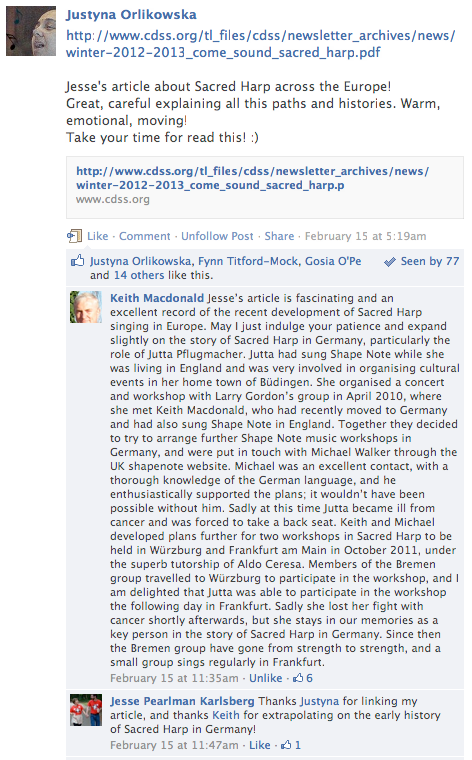I’ve had some great opportunities this fall to start thinking through the research I’ve been conducting in connection with my dissertation project and to get feedback on my work from colleagues.
- In October I traveled to the American Folklore Society annual meeting in Providence, Rhode Island, where I presented a paper on the sometimes fraught relationships between Sacred Harp singers and the folklorists who have studied and promoted their music. My paper, titled “Folklorization and Sustainability in the Twentieth-Century Spread of Sacred Harp Singing,” recounted the style’s folklorization during the twentieth century and then assessed how two twenty-first-century efforts to spread Sacred Harp singing ((Specifically, Cold Mountain and Camp Fasola.)) cultivated particular audiences and examined how sustainable these efforts have been.
- In November I participated in the Atlanta Graduate Student Conference on U.S. History held at Emory University. My paper, “Modernity and Historicization in Joseph Stephen James’s Original Sacred Harp (1911),” examined the circumstances leading to James’s 1911 revision of the nineteenth-century Sacred Harp tunebook. I argued that James sought to both modernize the book so that it better aligned with his vision of a “New South” and to historicize it so that it stood for noble, Christian values James associated with his past and worried might be lost in the shift from rural to urban and antebellum to postbellum. I was grateful for to my session’s respondent Scott L. Matthews, a lecturer in history at Georgia State University who studies documentary expression in the U.S. South.
- Later in November I presented a paper as part of a session I organized for the American Studies Association annual meeting titled “Folklorization on the National Mall: Representations of Culture through the Smithsonian Folklife Festival.” My co-panelists Virginia Myhaver, Olivia Cadaval, and Diana Baird N’Diaye presented papers that differently interrogated the interactions between curators, presenters, interpreters, and audience members at Smithsonian Festivals from the 1970s to the 2010s. William S. Walker, author of A Living Exhibition: The Smithsonian and the Transformation of the Universal Museum (University of Massachusetts Press, 2013), who has presented and written extensively on the Smithsonian Institution, offered insightful feedback on the papers. My paper, “Participation on Folklore’s Terms: Sacred Harp Singing at the 1970 Smithsonian Festival of American Folklife,” focused on an evening performance by two groups of Sacred Harp singers—one black, the other white—at the 1970 folklife festival. I analyzed how folklorization conditioned the singers’ presentation and reception, and assessed how the two groups approached their appearance and were later affected by it.
